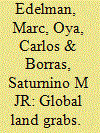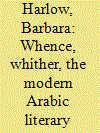|
|
|
Sort Order |
|
|
|
Items / Page
|
|
|
|
|
|
|
| Srl | Item |
| 1 |
ID:
124908


|
|
|
|
|
| Publication |
2013.
|
| Summary/Abstract |
Scholars, practitioners and activists generally agree that investor interest in land has climbed sharply, although they differ about what to call this phenomenon and how to analyse it. This introduction discusses several contested definitional, conceptual, methodological and political issues in the land grab debate. The initial 'making sense' period drew sweeping conclusions from large databases, rapid-appraisal fieldwork and local case studies. Today research examines financialisation of land, 'water grabbing', 'green grabbing' and grabbing for industrial and urbanisation projects, and a substantial literature challenges key assumptions of the early discussion (the emphasis on foreign actors in Africa and on food and biofuels production, the claim that local populations are inevitably displaced or negatively affected). The authors in this collection, representing a diversity of approaches and backgrounds, argue the need to move beyond the basic questions of the 'making sense' period of the debate and share a common commitment to connecting analyses of contemporary land grabbing to its historical antecedents and legal contexts and to longstanding agrarian political economy questions concerning forms of dispossession and accumulation, the role of labour and the impediments to the development of capitalism in agriculture. They call for more rigorous grounding of claims about impacts, for scrutiny of failed projects and for (re)examination of the longue durée, social differentiation, the agency of contending social classes and forms of grassroots resistance as key elements shaping agrarian outcomes.
|
|
|
|
|
|
|
|
|
|
|
|
|
|
|
|
| 2 |
ID:
131552


|
|
|
|
|
| Publication |
2014.
|
| Summary/Abstract |
Postwar Lebanon, Sufism, imperial translations, Hamlet, trials and atlases, city streets, literary cafés, and Tahrir Square: disorienting as these various themes might appear to be, they nonetheless entitle eight recent inquiries into contemporary-and precedent-directions of literary critical studies of the modern Arabic novel and their calculated revisions of, perhaps, another Arabic literary historical narrative that necessarily engages multigenre, comparative literary-historical investigations. Each of the works under review here was published between 2010 and 2013, with just one specifically, and that ex post facto, addressing the momentous events in Cairo's Tahrir Square in the early months of 2011. In other words, these works might well have already anticipated a more than seasonal, some would even argue historic, "Arab spring," and at least several of the works' authors found it necessary to append an epilogue to their in-production text, or otherwise slightly, subtly, revise at the last minute their presumptive chronologies and the contested trajectories of modern Arabic literature that attend them. From the classically proverbial "tradition versus modernity" discussions through their historicist implications for the cultural production of new media and alternative public spheres, each of these studies seeks, in its own way/s, to instantiate Arabic literature-and Arabic literary criticism-within and against its respected precursors. But where will that self-same literature, and its current critical mediations, eventually wind up, whether globally, nationally, or historically?
|
|
|
|
|
|
|
|
|
|
|
|
|
|
|
|
|
|
|
|
|